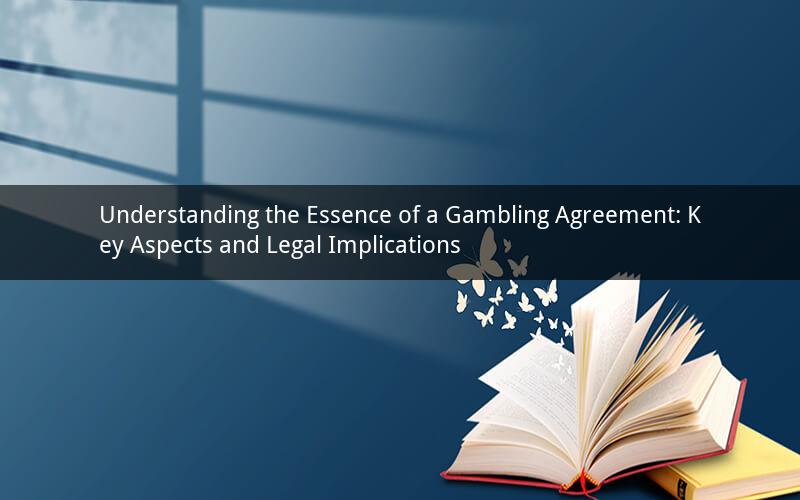
In the vast realm of gambling, one crucial element stands out as the foundation of any betting transaction: the gambling agreement. This agreement serves as a legal framework that governs the rights and obligations of both the bettor and the gambling establishment. This article delves into the intricacies of a gambling agreement, its key aspects, and the legal implications that arise from it.
1. Definition of a Gambling Agreement
A gambling agreement is a contract formed between a bettor and a gambling establishment, where the bettor agrees to place a bet on a specific event in exchange for a certain amount of money or other consideration. The agreement is binding on both parties and establishes the terms and conditions under which the bet is made.
2. Key Aspects of a Gambling Agreement
a. Offer and Acceptance
A gambling agreement is based on the principle of offer and acceptance. The gambling establishment extends an offer to accept bets on specific events, and the bettor accepts this offer by placing a bet. Both parties must agree on the terms and conditions of the bet, including the stakes, odds, and potential winnings.
b. Validity of the Agreement
For a gambling agreement to be valid, it must meet certain criteria:
- Consent: Both parties must freely and voluntarily enter into the agreement without any coercion or undue influence.
- Capacity: Both the bettor and the gambling establishment must have the legal capacity to enter into a contract.
- Legality: The agreement must be legal and not involve any illegal activities.
c. Terms and Conditions
The terms and conditions of a gambling agreement encompass various aspects, such as:
- Stakes: The amount of money or other consideration wagered on the event.
- Odds: The likelihood of the event occurring, which determines the potential winnings.
- Payment and Withdrawal: The procedures for depositing and withdrawing funds from the bettor's account.
- Cancellation and Refunds: The conditions under which a bet can be cancelled and refunds can be issued.
- Privacy and Security: The measures taken by the gambling establishment to protect the bettor's personal and financial information.
3. Legal Implications of a Gambling Agreement
a. Rights and Obligations
A gambling agreement imposes certain rights and obligations on both the bettor and the gambling establishment:
- The bettor has the right to receive the winnings, provided the bet is won and the terms and conditions of the agreement are met.
- The gambling establishment has the right to collect the stakes and pay out the winnings, subject to the terms and conditions of the agreement.
b. Dispute Resolution
In case of a dispute between the bettor and the gambling establishment, the agreement serves as a reference for resolving the issue. Disputes can arise due to various reasons, such as incorrect odds, delayed payouts, or non-compliance with the terms and conditions.
c. Liability
Both parties may be held liable for breaches of the gambling agreement. For instance, the gambling establishment may be liable for failing to pay out winnings in a timely manner or for providing incorrect odds. Similarly, the bettor may be liable for attempting to defraud the gambling establishment or for placing bets in violation of the agreement.
4. Types of Gambling Agreements
a. Sports Betting Agreements
Sports betting agreements involve placing bets on various sports events, such as football, basketball, and tennis. These agreements typically include specific terms related to the event, odds, and potential winnings.
b. Casino Agreements
Casino agreements govern betting on games of chance, such as slots, poker, and roulette. These agreements focus on the rules and procedures for playing the games and the distribution of winnings.
c. Poker Agreements
Poker agreements are unique in that they involve a combination of skill and chance. These agreements cover the rules of the game, the betting structure, and the distribution of winnings.
5. Conclusion
In conclusion, a gambling agreement is a critical element in the world of gambling, providing a legal framework for bettors and gambling establishments. Understanding the key aspects and legal implications of a gambling agreement is essential for both parties to ensure a fair and transparent betting experience. By adhering to the terms and conditions of the agreement, bettors and gambling establishments can mitigate disputes and foster a healthy betting environment.
Questions and Answers:
1. Q: What is the primary purpose of a gambling agreement?
A: The primary purpose of a gambling agreement is to establish the terms and conditions under which a bet is made, ensuring a fair and transparent betting experience for both the bettor and the gambling establishment.
2. Q: Can a gambling agreement be canceled after it is entered into?
A: Yes, a gambling agreement can be canceled under certain conditions, such as mutual consent or if one of the parties fails to comply with the terms and conditions of the agreement.
3. Q: Are there any legal requirements for a gambling agreement to be valid?
A: Yes, a gambling agreement must meet certain legal requirements, such as consent, capacity, and legality, to be considered valid.
4. Q: Can a bettor be held liable for breaching a gambling agreement?
A: Yes, a bettor can be held liable for breaching a gambling agreement, especially if the breach involves fraud, deceit, or violation of the agreement's terms and conditions.
5. Q: What are the potential consequences of a gambling agreement dispute?
A: The potential consequences of a gambling agreement dispute can include financial penalties, legal action, and damage to the reputation of both the bettor and the gambling establishment. It is in the best interest of both parties to resolve disputes through the terms and conditions outlined in the agreement.